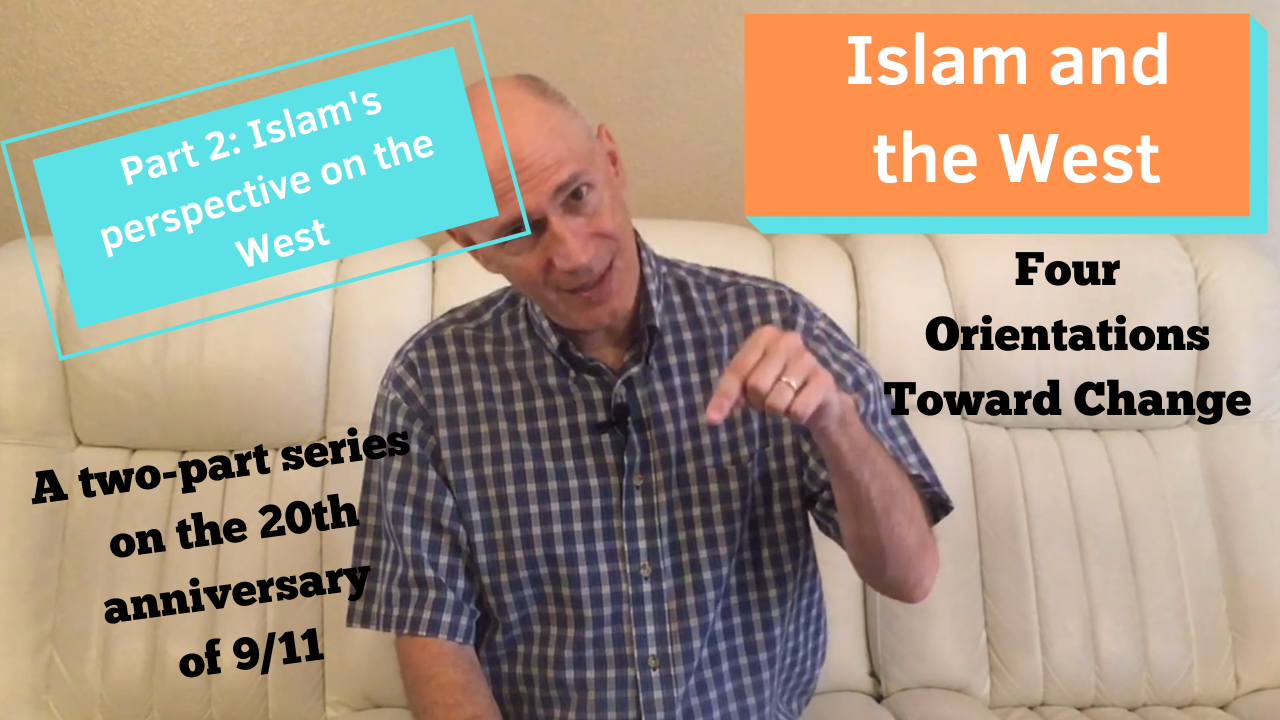09/11/2021 – Islam and the West Part 2

Why is there all this misunderstanding between Islam and the West? Well, there’s reasons for it. Join me in the second of this special two-part 9/11 edition. This is TenOnReligion.
Hey peeps, it’s Dr. B. with TenOnReligion. This video is closed-captioned here on YouTube and the transcript is available at TenOnReligion.com. This is a special two-part edition of TenOnReligion on the 20th anniversary of 9/11. Not many religion YouTubers attempt a video on the perspectives between Islam and the West, but I thought this would be a good opportunity to wade into the deep end of the pool because we need to really explain what’s going on here. By the way, if you like religious studies content go ahead and smash that sub button and share because it really helps out the channel. One huge thing to keep in mind here is that the both the term and the idea of Islam mean a lot of different things to a lot a different people and that’s one of the reasons why there’s a lot of misunderstanding. So, the first episode focused more on the West’s side of the equation using the ideas of the Islamic scholar and author, Tarek Osman. This second episode is going to focus on detailing some Islamic perspectives using the ideas of the Islamic scholar and author, John Esposito from Georgetown University, specifically his 2005 book, Islam: The Straight Path.
We’re going to first describe how Esposito differentiates between Islamic revivalists and radical activists and then detail Esposito’s four orientations on change in Islam. After that, I’ll have a few comments to sum it all up. Let’s get started.
First off, other Islamic scholars would perhaps use different terms than the ones Esposito uses, although I’m not entirely sure about that, but since we’re using his ideas, we’re going to use his terminology. He describes Islamic revivalists and contrasts them with what he calls radical activists giving six main points for each. So, we’ll start with the revivalists.
- Islam is a total and comprehensive way of life. Religion is integral to politics, law, and society.
- The failure of Muslim societies is due to their departure from the straight path of Islam and their following a Western secular path, with its secular materialistic ideologies and values.
- The renewal of society requires a return to Islam, an Islamic religiopolitical and social reformation or revolution, that draws its inspiration form the Qur’an and from the first great Islamic movement led by the Prophet Muhammad.
- To restore God’s rule and inaugurate a true Islamic social order, Western-inspired civil codes must be replaced by Islamic law, which is the only acceptable blueprint for Muslim society.
- Although the Westernization of society is condemned, modernization as such is not. Science and technology are accepted, but they are to be subordinated to Islamic belief and values in order to guard against the Westernization and secularization of Muslim society.
- The process of Islamization, or more accurately, re-Islamization, requires organizations or associations of dedicated and trained Muslims, who by their example and activities, call on others to be more observant and who are willing to struggle (or, jihad) against corruption and social injustice.
Okay, even though it might not seem like to some viewers, the revivalist view is the more moderate of the two that Esposito describes. To see why this is the case, here’s the six main points that Esposito details about the second group, the radical activists.
- Three things pit the West against the Islamic world: a Crusader mentality, Western and Eastern neocolonialism (in particular, the United States, and until the end of the Cold War, the Soviet Union), and lastly, the power of Zionism.
- Establishment of an Islamic system of government is not simply an alternative but an Islamic imperative, based on God’s command or will. Therefore, all Muslims must obey and follow this divine mandate by struggling to implement and follow God’s law.
- Since the legitimacy of Muslim governments is based on the Sharia, governments that do not follow it are illegitimate. Those who fail to follow Islamic law, governments and individuals, are guilty of unbelief. They are no longer Muslim but atheists whose unbelief demands holy war.
- Opposition to illegitimate governments extends to the official ulama, the religious establishment, and state-supported mosques and preachers who are considered to have been co-opted by the government.
- Jihad against unbelief and unbelievers is a religious duty. Therefore, all true believers are obliged to combat such governments and their supporters, whether individuals or foreign governments. Radicals demand total commitment and obedience. One is either a true believer or an infidel, saved or damned, a friend or an enemy of God. The army of God is locked in battle or holy war with the followers of Satan.
- Christians and Jews are generally regarded as unbelievers rather than “People of the Book” because of their connections with Western (specifically Christian) colonialism and Zionism. They are seen as partners in a Judeo-Christian conspiracy against Islam and the Muslim world. Thus, non-Muslim minorities are often subjected to persecution.
If it’s not already obvious, the radical activists are significantly more conservative. The revivalists and the radical activists are clearly two very different perspectives we are dealing with here, but, in the same book, Esposito goes on to describe four orientations towards change in Islam. Listen and let me know which one of these you think is the most interesting.
First, secularists – religion should be restricted to private life. They believe that mixing religion with politics is inappropriate and regard those who do so as manipulating Islam for political, rather than religious, ends.
Second, conservative – Islam is a closed cultural system fully articulated in the past. Since Islamic law is the divinely revealed path, it is not the law that must change or modernize, but society that must conform to God’s will.
Third, neotraditionalists – claim the right to go back to the fundamental sources of Islam to reinterpret and reapply them to contemporary needs and conditions. While Westernization is rejected, selective modernization is not. Science and technology are cautiously appropriated and “Islamized,” that is, subordinated to Islamic values and purposes.
Fourth, reformists – maintain that the regulations enshrined in the law books represent the understanding and interpretation of early jurists who applied the principles and values of Islam to their societies. They distinguish between the revealed immutable Sharia principles and laws contained in the corpus of traditional law and those regulations in Islamic law that are contingent and relative. The latter need to be reformulated in light of the needs of modern society.
So, comment on what you found interesting about these positions that Esposito describes. Which orientation towards change in Islam seems the most promising and why?
My quick comments on all of this? It just seems like colonialism is such a huge part of the issue. When a group’s economic system is suddenly taken over or imposed from an external group like what happened in many countries in the Middle East after World War I, people are gonna react, and religion is a part of that reaction. Maybe if the political and economic takeover had had a more moderate approach from Western countries, the response from the people living in those countries might have been a little more open. But capitalism can get ugly real fast.
Okay, and with that, let me know any other comments you have about this second episode. In these two episodes, I hope I was able to help you understand some of the big picture surrounding Islam and the West. Until next time, stay curious. If you enjoyed this, please like and share this video and subscribe to this channel. This is TenOnReligion.


